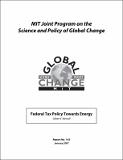| dc.contributor.author | Metcalf, Gilbert E. | |
| dc.date.accessioned | 2007-08-15T17:23:50Z | |
| dc.date.available | 2007-08-15T17:23:50Z | |
| dc.date.issued | 2007-01 | |
| dc.identifier.uri | http://mit.edu/globalchange/www/abstracts.html#a142 | |
| dc.identifier.uri | http://hdl.handle.net/1721.1/38456 | |
| dc.description | Abstract in HTML and technical report in PDF available on the Massachusetts Institute of Technology Joint Program on the Science and Policy of Global Change website (http://mit.edu/globalchange/www/). | en |
| dc.description.abstract | On Aug. 8, 2005, President Bush signed the Energy Policy Act of 2005 (PL 109-58). This was the first major piece of energy legislation enacted since 1992 following five years of Congressional efforts to pass energy legislation. Among other things, the law contains tax incentives worth over $14 billion between 2005 and 2015. These incentives represent both pre-existing initiatives that the law extends as well as new initiatives.
In this paper I survey federal tax energy policy focusing both on programs that affect energy supply and demand. I briefly discuss the distributional and incentive impacts of many of these incentives. In particular, I make a rough calculation of the impact of tax incentives for domestic oil production on world oil supply and prices and find that the incentives for domestic production have negligible impact on world supply or prices despite the United States being the third largest oil producing country in the world.
Finally, I present results from a model of electricity pricing to assess the impact of the federal tax incentives directed at electricity generation. I find that nuclear power and renewable electricity sources benefit substantially from accelerated depreciation and that the production and investment tax credits make clean coal technologies cost competitive with pulverized coal and wind and biomass cost competitive with natural gas. | en |
| dc.description.sponsorship | This study received support from the MIT Joint Program on the Science and Policy of Global Change, which is funded by a consortium of government, industry and foundation sponsors. | en |
| dc.language.iso | en_US | en |
| dc.publisher | MIT Joint Program on the Science and Policy of Global Change | en |
| dc.relation.ispartofseries | Report no. 142 | en |
| dc.title | Federal Tax Policy Towards Energy | en |
| dc.type | Technical Report | en |
| dc.identifier.citation | Report no. 142 | en |
